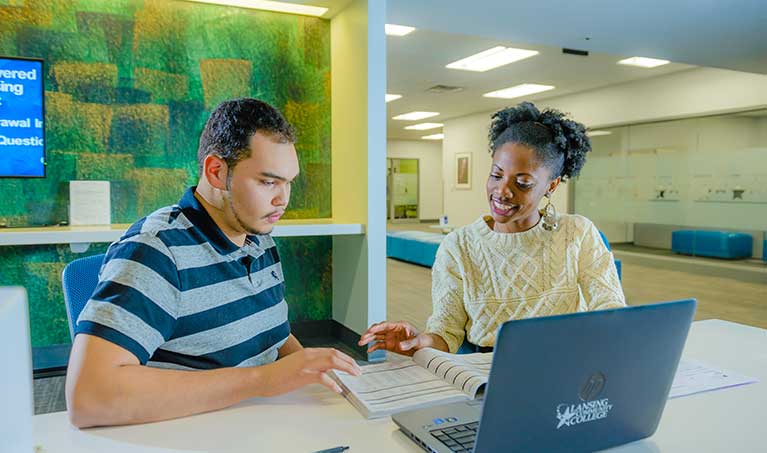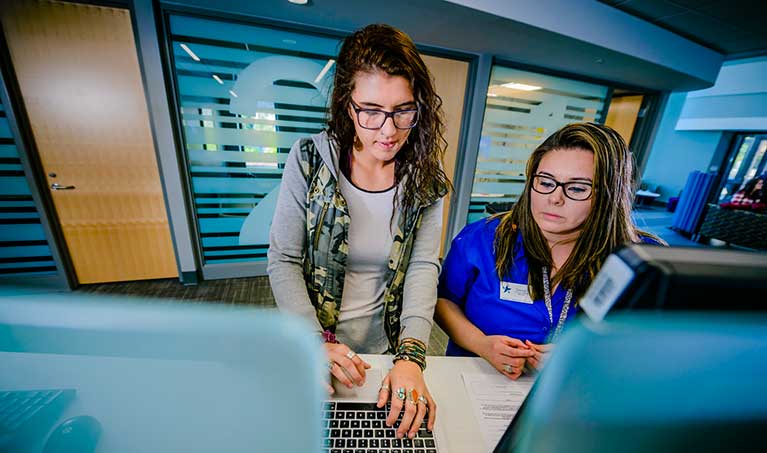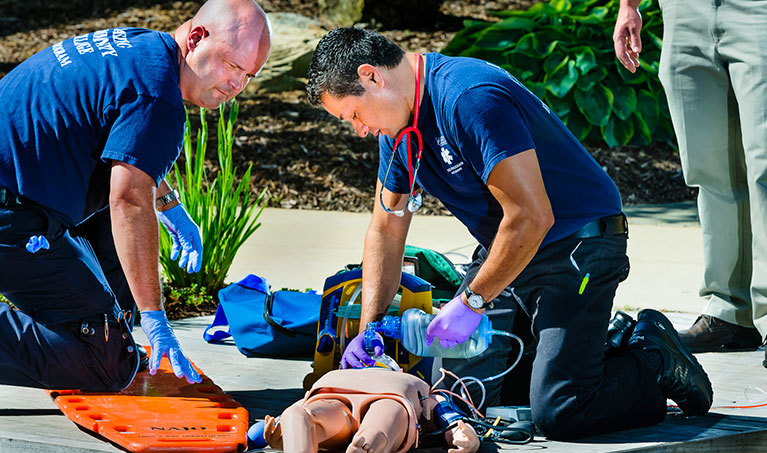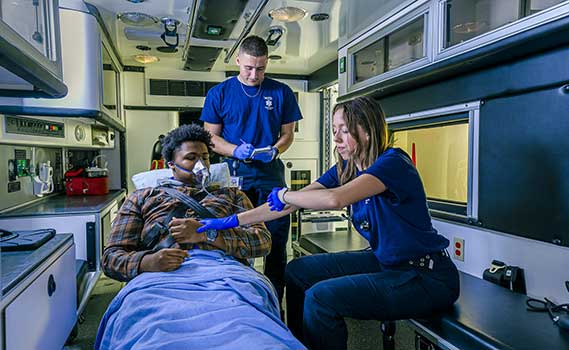Basic-EMT Program Overview
The primary focus of the Emergency Medical Technician (EMT) is to provide basic emergency medical care and transportation for critical and emergent patients who access the emergency medical system. This individual possesses the basic knowledge and skills necessary to provide patient care and transportation. Emergency Medical Technicians function as part of a comprehensive EMS response, under medical oversight. Emergency Medical Technicians perform interventions with the basic equipment typically found on an ambulance. The Emergency Medical Technician is a link from the scene to the emergency health care system.
Please call the Health and Human Services office at 517-483-1410 if you have any questions on obtaining department approval.
A written examination offered by the National Registry of EMT's must be successfully completed for licensure. State licensing is performed through the State of Michigan Department of Health and Human Services, Division of Emergency Preparedness, EMS, and Systems of Care.
Technical Standards
Technical Standards
In keeping with its mission and goals and compliance with Section 504 of the Rehabilitation Act of 1973 and the Americans with Disabilities Act, Lansing Community College promotes an environment of respect and support for persons with disabilities and will make reasonable accommodations. The definition of individuals with disabilities are those who currently have, have a record of having, or are regarded as having a physical or mental impairment that substantially limits one or more major life activity. Major life activities include caring for oneself, performing manual tasks, walking, seeing, hearing, breathing, and working.
In keeping with the standards set by the Committee on Accreditation of Educational Programs for Emergency Medical Professions (CoAEMSP); students must be able to meet the motor, cognitive, & psychological demands associated with the profession. These technical standards are established to ensure both patient and operator safety.
Essential motor skills required to meet the class and clinical practice outcomes are:
- STRENGTH: Body condition that would not be adversely affected by frequently having to walk, stand, lift, carry, and balance at times, in excess of 125 pounds.
- MANUAL DEXTERITY: Perform motor skills such as standing, walking, handshaking; manipulative skills such as writing and typing; venipuncture, calibration of equipment.
- COORDINATION: Perform body coordination such as walking, filing, retrieving equipment; eye-hand coordination such as keyboard skills; tasks which require arm-hand steadiness such as taking vital signs, blood pressure, calibration of tools and equipment, etc.
- MOBILITY: Perform mobility skills such as walking, standing, occasionally prolonged standing or sitting in an uncomfortable position.
- VISUAL ABILITY: See objects far away, discriminate colors, and see objects closely as in reading faces, dials, monitors, syringes, medication labels, etc.
- HEARING: Hear normal sounds with background noise and to distinguish sounds.
- TACTILE ABILITY: Prove tactile ability sufficient for physical assessment. Perform palpation, functions of physical examination and/or those related to therapeutic intervention, e.g., insertion of a catheter.
Essential cognitive skills required to meet the class and clinical practice outcomes:
- CONCENTRATION: Concentrate on details with moderate number of interruptions, such as patient and co-worker requests, alarms, IVACs, calculating medication dosages, equipment noise, etc. Attend to task/functions that require up to 60 minutes in length and handle a variety of tasks for periods up to 12 hours. No mental, nervous, organic or functional disease, or psychiatric disorder likely to interfere with the ability to coordinate treatment planning; work with other health care professionals and patients; coordinate treatment procedures; and safely operate medical/Paramedic devices and instruments.
- CONCEPTUALIZATION AND CRITICAL THINKING: Comprehend and integrate knowledge from didactic courses and professional literature into the assessment, planning, implementation, and evaluation of Paramedic treatment. Critical thinking ability sufficient for clinical judgment to identify cause-effect relationships in clinical situations and develop and implement treatment/care plans. Prioritize, organize, and utilize time-management skills to deliver patient care in a timely and accurate manner. Adhere to: HIPAA and OSHA guidelines, Paramedic professional standards, LCC and Paramedic Program professional conduct guidelines as well as clinical policies and procedures.
- MEMORY: Remember task/assignments given to self and others over both short and long periods (i.e., information gathered in assessing patients and didactic courses).
Essential psychological skills required to meet the class and clinical practice outcomes:
- INTERPERSONAL: Demonstrate interpersonal abilities to interact compassionately and effectively with patients from a variety of social, emotional, cultural, and intellectual backgrounds. Establish professional and respectful rapport with patients, classmates, staff, faculty, and other healthcare providers. Work effectively as a team member.
- COMMUNICATION: Speak and write clearly and concisely with patients, classmates, staff, faculty, and other health care providers in English when applicable using standard medical and Paramedic terminology. Communicate sufficiently for interaction with others in written form. Writing skills include being able to prepare legibly written documentation. Explain treatment procedures, initiate health teaching, interpret health care actions, and patient responses. Be able to read and interpret directions from one’s supervisors.
- SUBSTANCE ABUSE: No current clinical diagnosis of alcoholism. Must not use Schedule 1 drugs or other substances such as amphetamines, narcotics, or any other habit-forming drug except those substances or drugs prescribed by a licensed medical practitioner; who is familiar with the individual's medical history and assigned duties and who has advised the individual that the prescribed substance or drug will not adversely affect the individual's ability to safely practice.
- STRESS: A student’s behavior and social skills must be acceptable with the college and clinical settings. A student must be able to: monitor his/her emotions; manage strong emotions (such as grief or anger) in a professional manner; perform multiple responsibilities concurrently; adapt to a changing environment/stress and deal with the unexpected (such as a crisis situation); work with patients who may be very young/old, critically ill/injured, or mentally/physically deficient/impaired.
DISCLAIMER:
The above statement of criteria is not intended as a complete listing of behaviors required for the Emergency Medical Services Program, but is a sampling of the types of abilities required by the student to meet program objectives and requirements. The Emergency Medical Services Program or its affiliated agencies may identify additional critical behaviors or abilities needed by students to meet program or agency requirements. The Emergency Medical Services Program reserves the right to amend this listing based on the identifications of additional standards or criteria for EMS students.
Occupational Risks
Provision of emergency medical services poses inherent occupational risks for EMS responders. Risks include the following.
- Violence/assaults
- Verbal threats/aggression
- Motor vehicle crashes
- Infectious disease
- Lifting injuries
- Sprains and strains
- Psychological trauma
- Hazardous chemical exposure
- Hyper/hypothermia
Occupational Risks: https://coaemsp.org/?mdocs-file=8720
Students will be required to complete a mandatory on-line OSHA Blood-Borne Pathogen and Universal Precautions program.
Related Links
Occupational Outlook Handbook
United States Department of Labor
Bureau of Labor Statistics
Michigan EMS Practitioners Association (MiEMSPA)
2123 University Park Drive
Suite 100
Okemos, MI 48864
National Association of Emergency Medical Technicians
408 Monroe St
Clinton MS 39056
Michigan Department of Health and Human Services
National Registry of Emergency Medical Technicians
PO Box 29233
Columbus OH 43229
National Highway Transportation Safety Administration
EMS Division
400 7th St SW NTS-14
Washington DC
EMT (Basic Emergency Medical Technician) Advising Guides
Steps to Apply & Register for the EMT Program
-

Apply to LCC
Complete the admissions application to become an official LCC student. To complete the application, you will need to know you SSN, email address and address of residence.

-

Activate Account
Now that you're in, activate your LCC account to get access to your email and important information from the College.
To activate your account, you will need the LCC Student ID number you received after you applied.

-

Assessment
If you haven't already, it's time to upload your high school transcript, SAT or ACT scores, or AP Test scores so that we can help determine your starting place at LCC. If you are not able to get placement levels with these documents, don't worry. You can take our placement tests.
You can check if you currently have levels in reading, writing, and math in the profile tab of your myLCC account.
Upload documents, check testing hours and location, and view sample questions through the testing center website.

-

Complete the EMT Academy Application
Once you have completed the college's general application, you may apply to the EMT Academy.
To get started with a new application, or to access an existing/saved EMT Academy application, please click the link below.
Now accepting applications for Spring 2026.
EMT ACADEMY APPLICATION
-

Await Acceptance Email
Upon successful completion of steps 1-4, the EMS Program Office will place a department approval on your account and send you instructions via your LCC student email on how to register for classes.


Contact Us
Emergency Medical Technician and Paramedic
Health and Human Services Division Office
HHS Building, 108
517-483-1410
517-483-1508 fax

